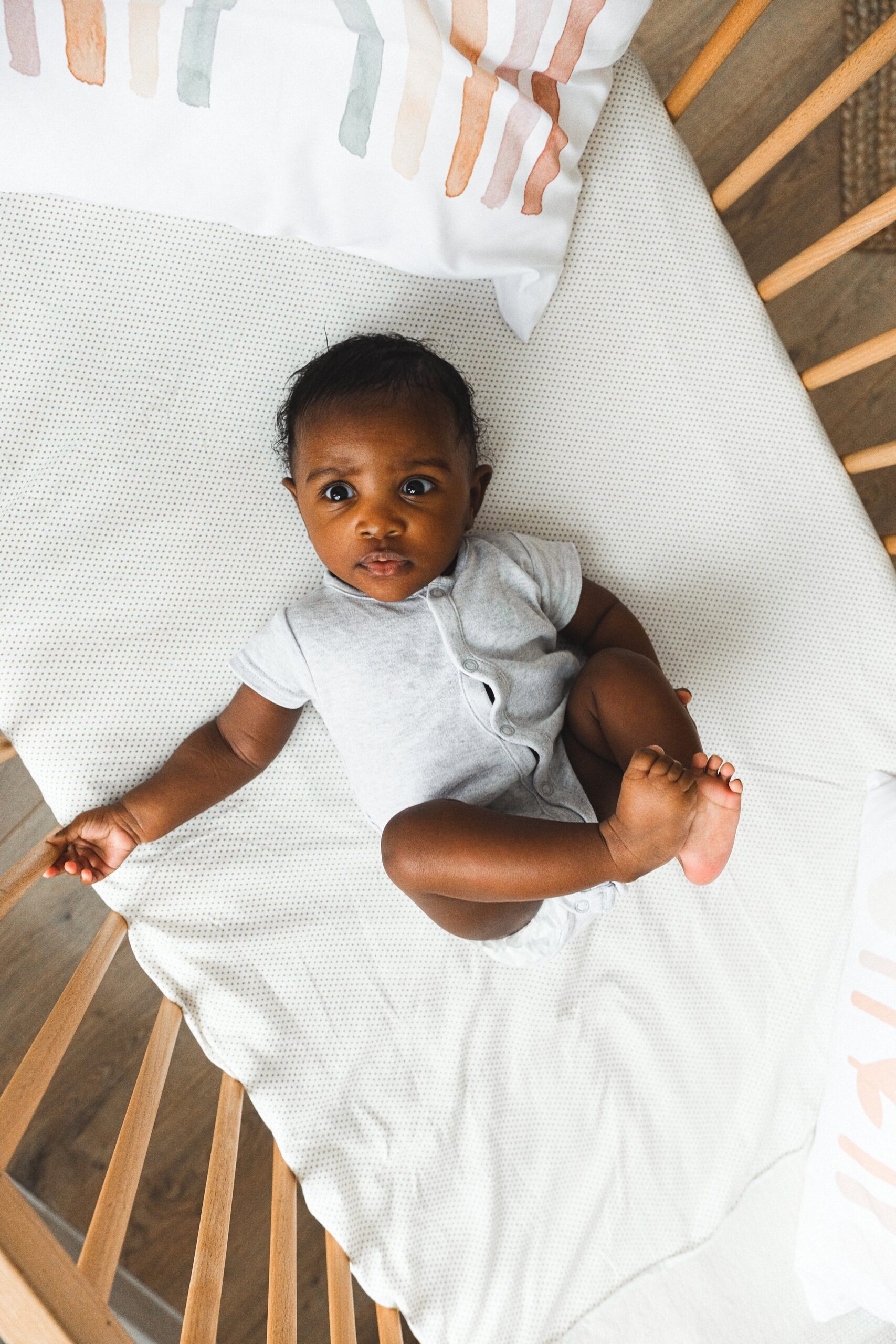I'm Rachael
Mom of 3 & Baby Sleep Expert with Big Sis Energy
& I’VE DONE ALL THE RESEARCH FOR YOU ALREADY.
Better sleep for the entire family
BROWSE COURSES
hey!
why is my 12-month old up like a newborn again?

The 12 Month Sleep “Regression” and what’s actually going on.
Is your 1 year old baby sleeping worse than ever? Babies at 12 months old often go through a regression with sleep. Parents of 1-year olds report their babies waking up more frequently, wanting to nurse more, and fighting naps. You’re not alone. While I don’t love the term sleep “regression” it is very common to see things backslide with your little one’s sleep right around their first birthday. A tell tale sign you’re going through it is your previously good (or just OK) sleeper starts waking up multiple times per night, wanting to feed round the clock, and starts fighting naps so hard you wonder if they’re ready for the 2-1 nap transition already. There are so many reasons for the 12 month sleep regression (or PROgression as I like to call it). You’re not crazy or doing anything wrong- promise!
I know you may be thinking, wait, we haven’t gotten through the 8-10 month progression! Or maybe you’re more in the — yikes, my baby’s sleep hasn’t changed at all! — camp. Both scenarios are 100% normal. I hear from parents who are going through various sleep progressions, and some babies experience them much more than others. Some will skip certain progressions entirely. There is a huge spectrum of what’s normal, and hitting a progression isn’t something to get freaked out about, just like you shouldn’t be scared if they haven’t gotten there yet. (I didn’t actually notice any changes in my son’s sleep after a year!)
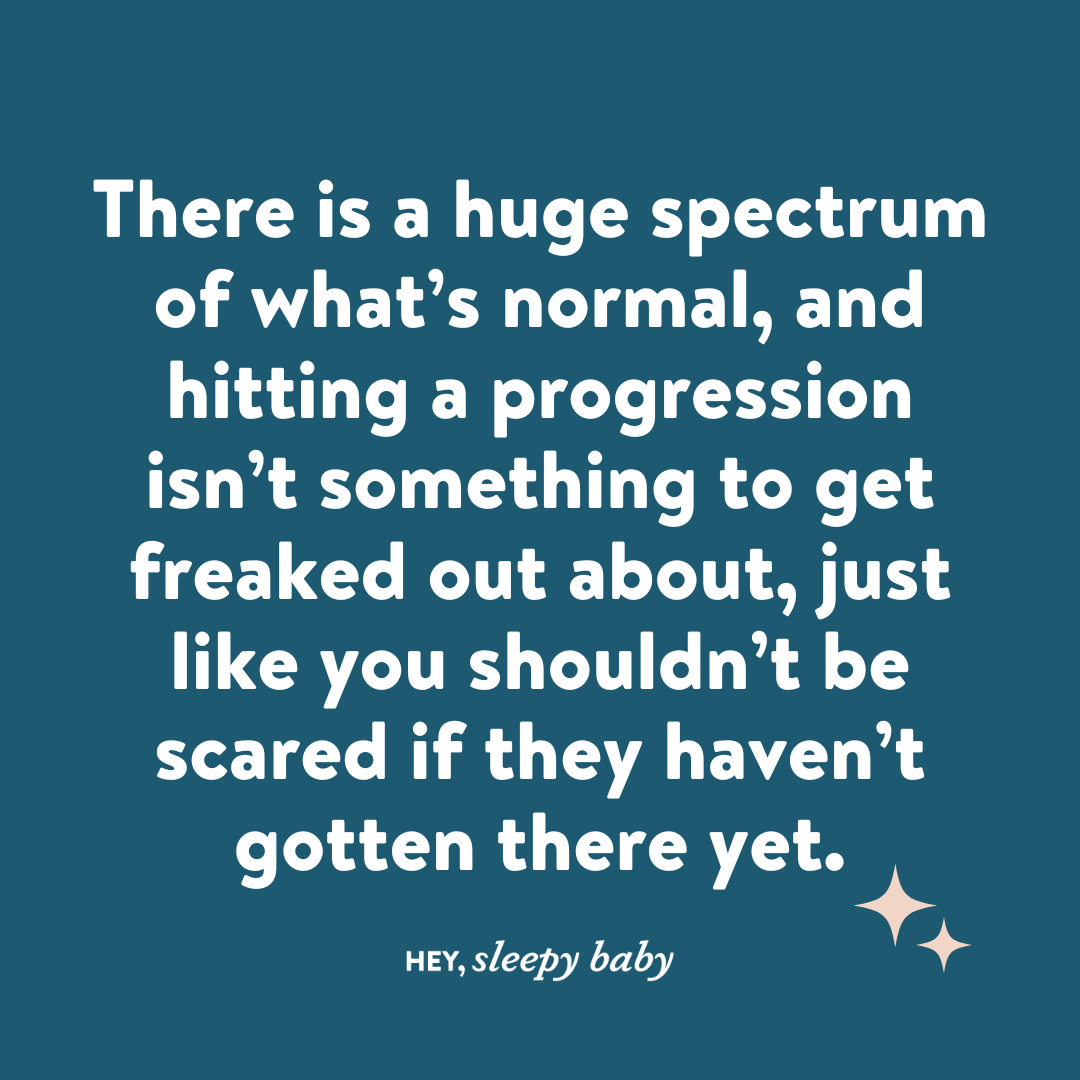
Here’s what we often see at 12 months & tips you can try:
Teething, developmental milestones like cruising and walking, language development, and separation anxiety- all of these things can impact sleep and make your nights feel like you’ve got a newborn again!
Babies often want to practice new skills overnight. They might be standing and cruising around in their crib or babbling to themselves, keeping them awake! To help with this try to give them plenty of time during the day for sensory play and physical activity. Set up little obstacle courses and give them a little “baby boot camp” to get all their energy out and to allow them to work on these new milestones.
Teething is common around a year old, and many toddlers are getting teeth back to back which means it could be a couple of weeks at a time with disrupted sleep. Teething pain tends to be worse at night. Talk with your doctor about pain management for your baby that you feel comfortable with but never use amber teething necklaces as they can be a very dangerous hazard.
Separation anxiety commonly spikes around 12 months. This might make your little one start to refuse their crib or get upset when you enter their bedroom at bedtime. Try to reframe bedtime to break the negative association with it. Remember that we don’t want the sleep space to equal separation. Spend time in your child’s room, near or in their crib, during happy awake time as well. Hang out and play in there together, doing anything your child enjoys. Try taking a break from their room if they are becoming very upset and go through the bedtime routine in another room for a few days. For separation anxiety, you can try some quick partings and games like hide and go seek with a toy.
By one year old, sleep needs tend to drop again. Most “toddlers” will need about 11-14 hours total sleep per 24 hours. For most, this looks like 10-12 hours overnight, and 1-3 hours during the day for naps. If on two naps, keep each one at 1.5 hours maximum. Remember that there is quite a range for average sleep and if your baby does well with a little more or less sleep than this there is no need to worry.
Wake time is about 3-4 hours for most 1 year olds. Some do well with a “2, 3, 4” schedule meaning 2 hours between waking up and the first nap, 3 hours between naps, and 4 hours before bedtime. This helps them build a little more sleep pressure before bedtime, which can help for things like false starts. Others need more consistent wake time or even a shorter wake window before bedtime. It’s all about experimentation for YOUR baby- there’s no right or wrong!
Bedtime is probably pretty consistent by this age, and most 1-year olds do well with a bedtime between 6:30-8:30pm depending on their napping and the family’s schedule.

Again, 12 months is a time tricky time & a common “sleep regression” so you might feel like things are harder right now than normal. If your 12 month old has never slept through the night, this is also not uncommon or a sign of things gone wrong. Night wakings and feedings are still normal at this age, though they should start to decrease in the second year of life.
Most babies are still on 2 naps at this time, though many try to trick us into dropping down to 1! You may see lots of naptime refusal at this age. Try to wait for at least a couple of weeks before deciding to transition for real. 12 Months is early for just one nap but not totally unheard of if your baby is lower sleep needs. You may consider shortening the first nap so that sleep pressure is built more easily in between. If there’s still a battle at bedtime or it’s taking your baby a very long time to fall asleep at bedtime you might have to shorted the second nap as well, meaning your baby will have less total daytime sleep. This may consolidate and lengthen again once they are on one nap per day, but might not. The drop to one nap is common between ages 13 months to 18 months old.
In the meantime, do whatever you need to do to get the nap to happen. Try bringing your baby for a drive if they tend to fall asleep in the car, or lay with them or put them in a carrier. You could try something new like rocking them instead of feeding to sleep, or turning on some calming music or a meditation track. Don’t be afraid to experiment and you might find something new that works!
To Recap:
how to get through a 12 month sleep progression (for sleepy babies)
It’s good to keep in mind that there isn’t one magical night when things go back to how they were before. It might take some experimenting before baby makes it through this sleep progression. That’s totally normal!
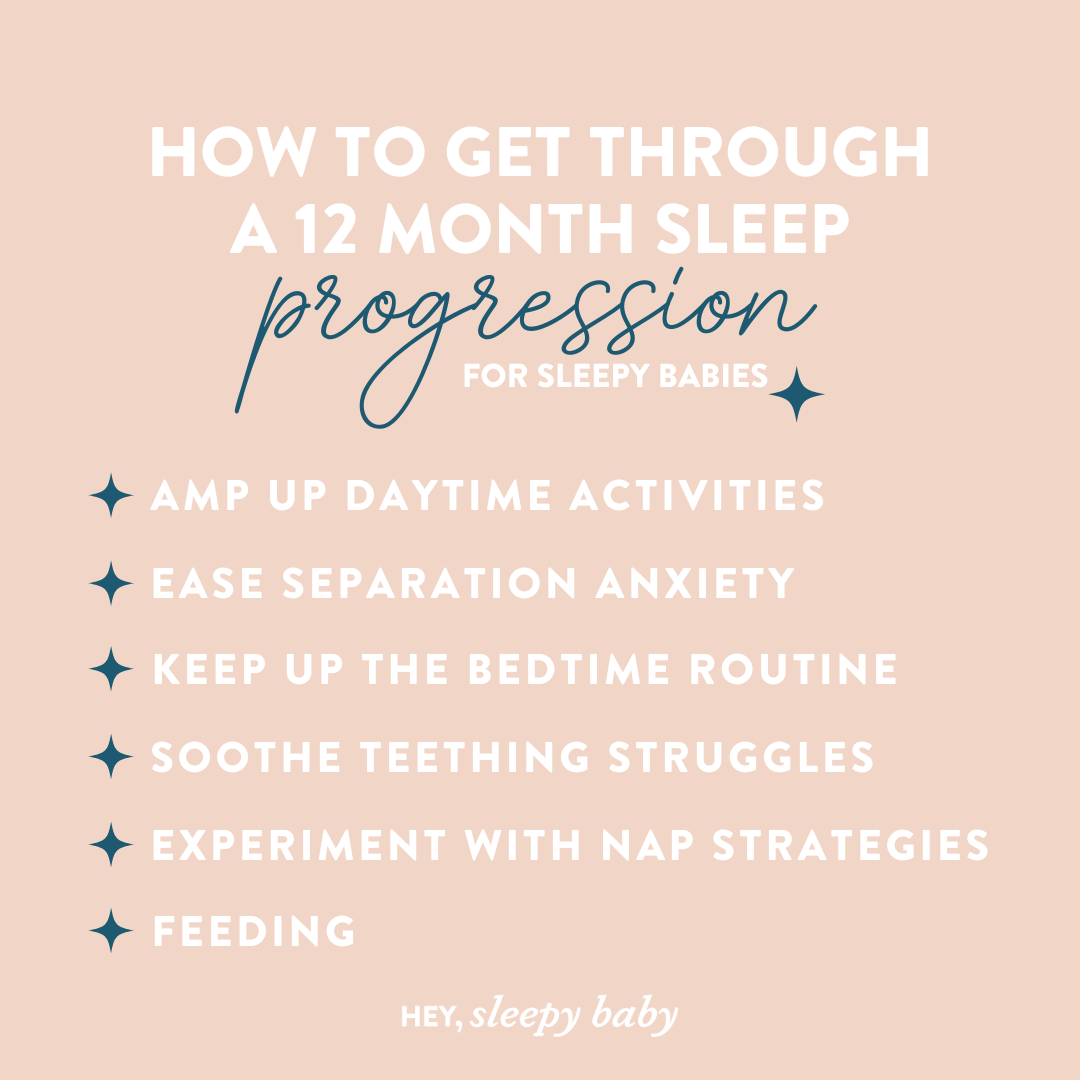
-
Amp up Daytime Activities: Give baby the opportunity to move and practice their new skills. Try including plenty of outdoor time for fresh air and vitamin D.
-
Ease Separation Anxiety: Give baby extra snuggles and cuddles, and keep them close as much as possible. Try to maximize your 1:1 time with baby. If you’re going to leave them, make sure to let them know by saying, “I’m going into the kitchen now and will be right back,” or something similar.
-
Keep up the Bedtime Routine: Aim for a consistent bedtime routine. Try to create a bedtime routine that is a source of connection and calm, rather than rushing and distraction.
-
Soothe Teething Struggles: Comfort teething pain as best you can. (See my Instagram highlight!)
-
Experiment with Nap Strategies: Consider capping the morning nap to see if you can still keep baby’s afternoon nap. At 12 months, you may find that your baby can only handle 30 minutes in the morning. You might also need to push the afternoon nap a bit further, extending the first wake window. Most babies will hang onto the second nap for another few months.
-
Feeding: If your baby is still waking for a feed or two in the night, this is totally normal. You don’t need to stop if it’s working fine for you. Either way, make sure baby is still getting plenty of nutrition through breast milk or formula, along with iron-rich foods.
how to get through a 12 month sleep progression (for sleepy parents)
Sleep progressions aren’t just tough on baby. They can be hard for parents too, especially if it feels like you “just” made it through the last progression.
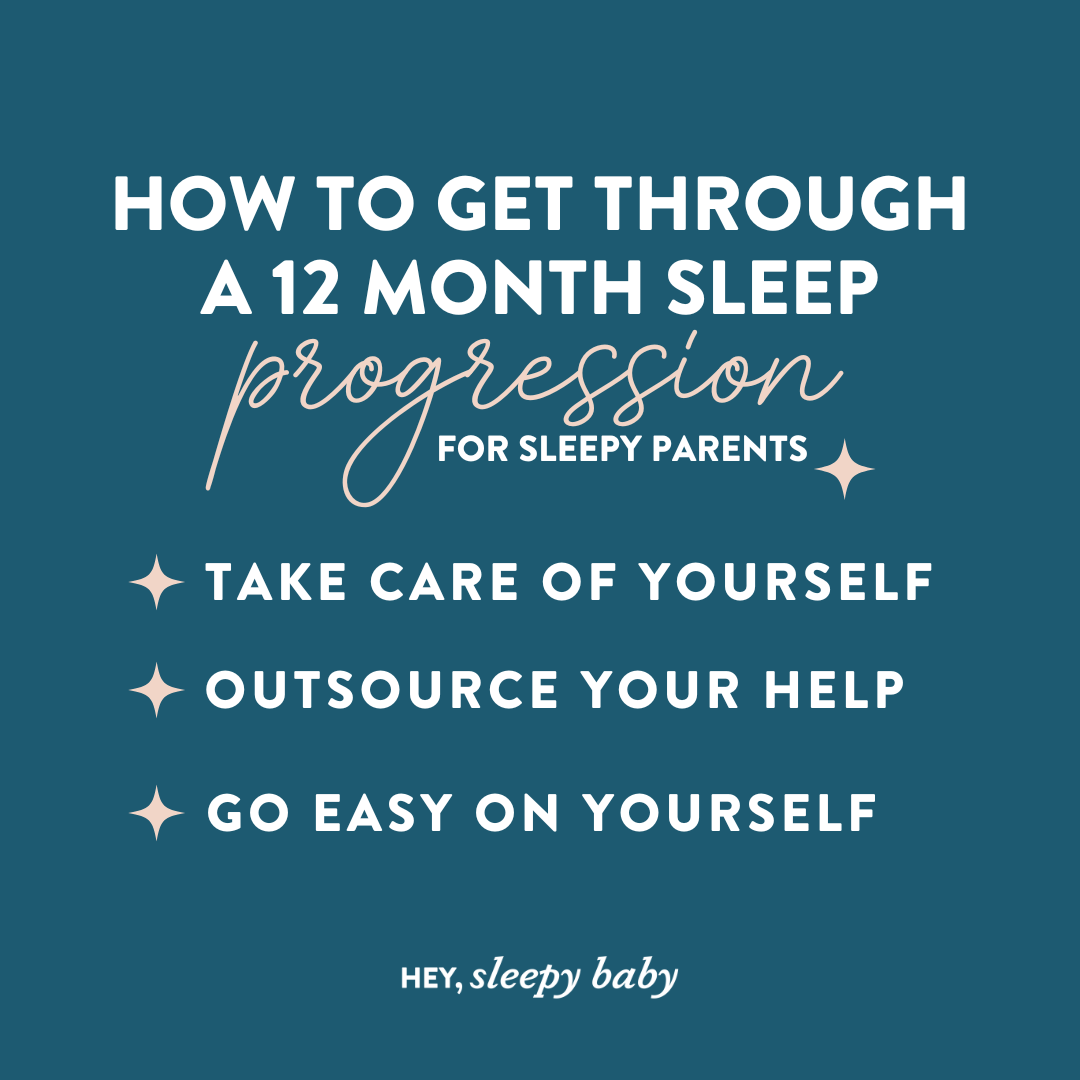
-
Take Care of Yourself. You have to fill your own cup before you can give to your family! Make sure you can get as much rest as possible, whether that means you’re contact napping (letting baby snooze in your arms) or practicing safe bed sharing, or incorporating a 5-minute self care routine.
-
Outsource Your Help: Outsource some jobs to your partner if you have one. Try to tag team as much as possible, whether you’re trading off the nighttime routine or taking turns with nighttime wakings.
-
Go Easy on Yourself: Now is not the time to worry about creating “bad sleep habits.” Don’t be afraid of occasional naps in the car or in the stroller if that’s the only way to get a nap in for now.
If you’re trying to transition out of cosleeping and baby is 12+ months, I’d try out a floor bed vs a crib! Lots of info for this in my floor bed highlight on Instagram, and if you need more support with getting started, you can try the Ultimate Crib & Floor Bed Guide.
If your baby is waking up and very upset or staying up for long periods of time, check out my “split nights” and “red flags” blogs. If you are struggling with naps, check out the 3 signs it’s time to drop a nap to see if your 1-year old is truly ready for the transition down to one nap per day.
If you are looking to move on from cosleeping or to make other supported changes to your little one’s sleep, then check out our Tender Transitions Course.
Hang in there and remember that this too shall pass!
Was this helpful? Save it for later!
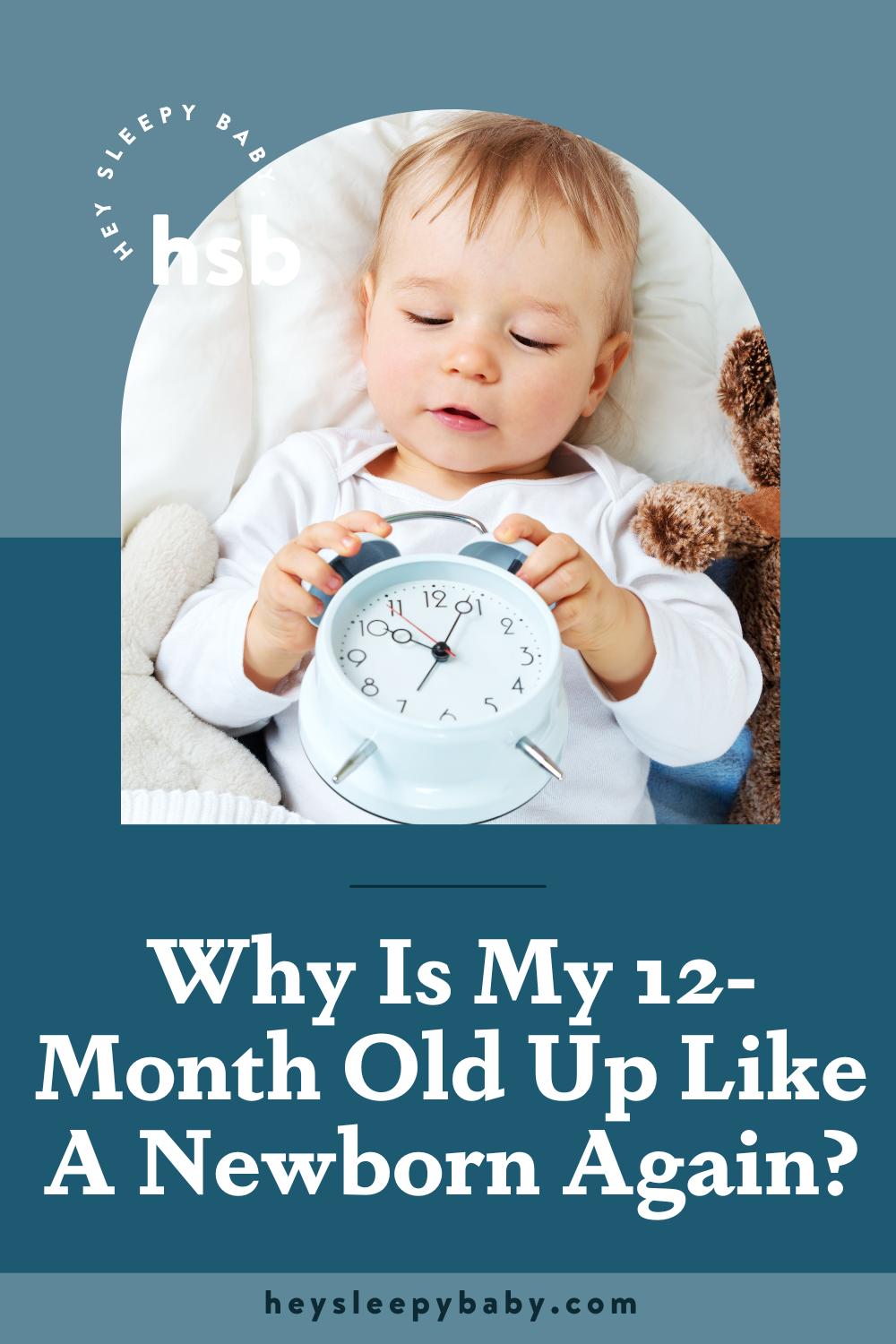
binge reads
We think you'll love these
You deserve to the
baby stage, not just "survive it."
And you DON'T have to sacrifice your values, ignore your instincts, or force yourself to follow a method you don't align with just to get your baby back to sleep.
I’m here to help you create a restful, sustainable sleep environment that honors both your baby’s needs AND your own (without the stress OR the guilt!) because, no, you don’t have to choose between the two.
enjoy!
BABY SLEEP COURSES →
BABY SLEEP CONSULTS →
Wish you could help your baby sleep better without resorting to sleep training? Download my FREE guide to a good night’s sleep and learn 8 simple, science-backed tips for supporting your child’s needs.
Traditional sleep training methods don’t have to be your solution to better sleep.
SLEEP TRAINING ISN’T THE ONLY WAY TO GET GOOD SLEEP
Hey, I'm Rachael and Hey, Sleepy Baby is for parents who want to get their nights back, without sleep training their babies.
NO ONE TOLD US POD
explorING the untold truths of parenting


